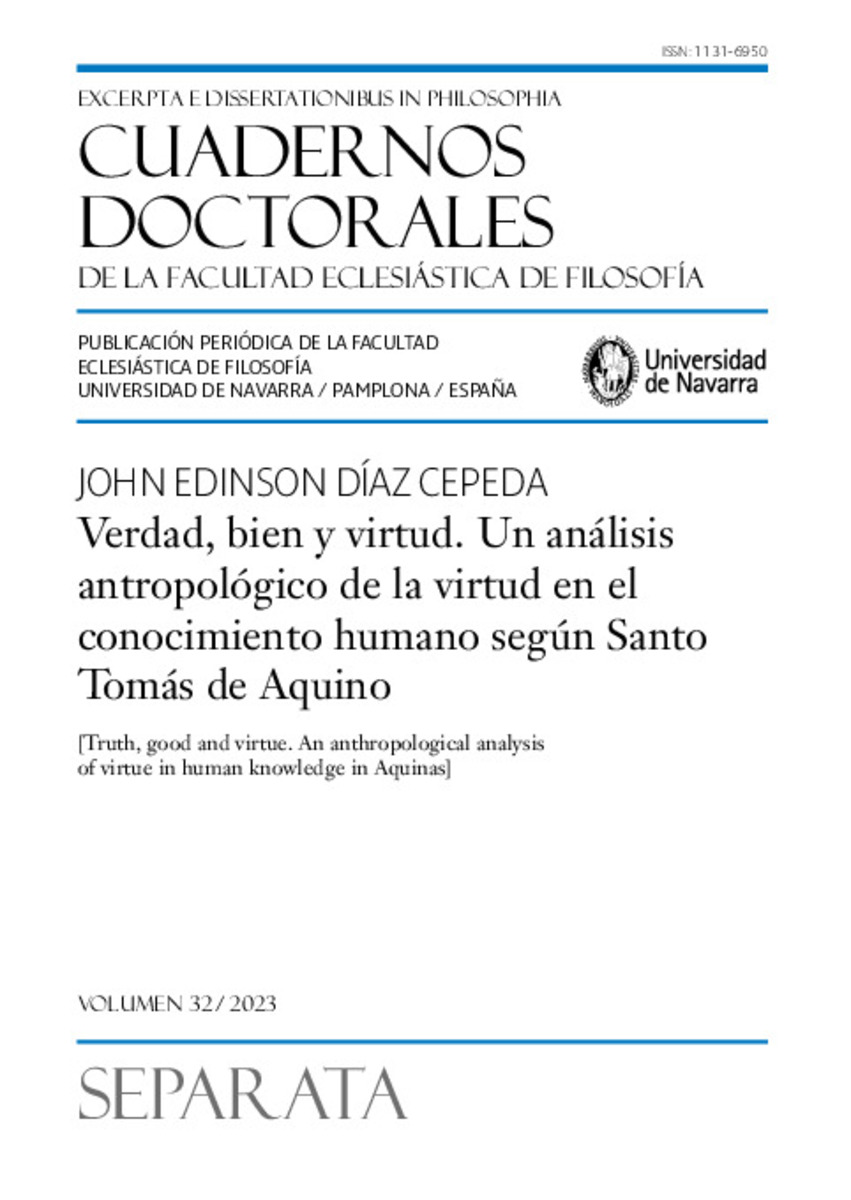Full metadata record
| DC Field | Value | Language |
|---|---|---|
| dc.creator | Díaz-Cepeda, J.E. (John Edinson) | - |
| dc.date.accessioned | 2023-12-19T17:39:59Z | - |
| dc.date.available | 2023-12-19T17:39:59Z | - |
| dc.date.issued | 2023 | - |
| dc.identifier.citation | Díaz-Cepeda, J.E. (John Edinson). "Verdad, bien y virtud. Un análisis antropológico de la virtud en el conocimiento humano según Santo Tomás de Aquino". Cuadernos Doctorales de Filosofía. Excerpta e dissertationibus in Philosophia. 32, 2023, 139 - 219 | es_ES |
| dc.identifier.issn | 1131-6950 | - |
| dc.identifier.uri | https://hdl.handle.net/10171/68115 | - |
| dc.description.abstract | La definición de verdad en el pensamiento de Santo Tomás lleva implícito una comprensión y estructuración de elementos que traslucen una posible conexión entre gnoseología y moral. A este respecto podemos decir que la definición de verdad para el Aquinate engloba tres aspectos que se pueden extraer de la noción de adaequatio, a saber, los aspectos cognoscitivo, manifestativo y teleológico. Se plantea entonces desde aquí una relación de complementariedad entre virtudes desde las nociones gnoseológicas mensura y adaequatio, nociones que de hecho reconducen la verdad del plano gnoseológico al plano moral de la virtud (status virtus). De este modo, la relación entre virtudes abre paso a comprender su interacción mutua desde el concepto de interhabitualidad propuesto en este trabajo. La interhabitualidad se comprende desde dos niveles: el primer nivel de interhabitualidad tiene que ver con la génesis u origen de las virtudes (semina virtutum). Esta primera relación interhabitual se fundamenta en tres virtudes: el intellectus, la sindéresis y la prudencia. Esta última hace de puente entre virtudes debido a que en ella se realiza plenamente la noción de mensura. Desde aquí se abre paso a un segundo nivel de interhabitualidad, el que concierne al uso (usus) del acto de la virtud. Para el Aquinate el buen uso del acto de la virtud intelectual depende de la virtud moral y deja abierta la cuestión sobre qué virtudes intervienen. De ahí que se proponga en este trabajo tres virtudes synergéticas para este cometido: La prudencia, la studiositas y la veracidad. | es_ES |
| dc.description.abstract | The definition of truth in the thought of Saint Thomas implies an understanding and structuring of elements that reveal a possible connection between epistemology and morality. In this regard we can say that the definition of truth for Aquinas encompasses three aspects that can be extracted from the notion of adaequatio, namely, the cognitive, manifestive and teleological aspects. From here, then, a complementary relationship between virtues arises from the epistemological notions mensura and adaequatio, notions that in fact redirect the truth from the epistemological plane to the moral plane of virtue (status virtus). In this way, the relationship between virtues opens the way in understanding their mutual interaction from the concept of interhabituality proposed in this work. Interhabituality is understood from two levels: the first level of interhabituality has to do with the genesis or origin of virtues (semina virtutum). This first interhabitual relationship is based on three virtues: the intellectus, synderesis and prudence. The latter acts as a bridge between virtues because the notion of mensura is fully realized in it. From here, the way is opened to a second level of interhabituality, the one that concerns the use (usus) of the act of virtue. For Aquinas, the proper use of the act of intellectual virtue depends on moral virtue and leaves open the question of what virtues intervene. Hence, three synergistic virtues are proposed in this work for this purpose: Prudence, the studiositas and veracity. | es_ES |
| dc.format.extent | 293 | es_ES |
| dc.language.iso | spa | es_ES |
| dc.publisher | Servicio de Publicaciones de la Universidad de Navarra | es_ES |
| dc.rights | info:eu-repo/semantics/openAccess | es_ES |
| dc.subject | Verdad | es_ES |
| dc.subject | interhabitualidad | es_ES |
| dc.subject | conocimiento | es_ES |
| dc.subject | Truth | es_ES |
| dc.subject | interhabituality | es_ES |
| dc.subject | knowledge | es_ES |
| dc.title | Verdad, bien y virtud. Un análisis antropológico de la virtud en el conocimiento humano según Santo Tomás de Aquino | es_ES |
| dc.type | info:eu-repo/semantics/article | es_ES |
| dc.publisher.place | Pamplona | es_ES |
| dadun.citation.endingPage | 219 | es_ES |
| dadun.citation.publicationName | Cuadernos Doctorales de Filosofía. Excerpta e dissertationibus in Philosophia | es_ES |
| dadun.citation.startingPage | 139 | es_ES |
| dadun.citation.volume | 32 | es_ES |
Files in This Item:
Statistics and impact
Items in Dadun are protected by copyright, with all rights reserved, unless otherwise indicated.






